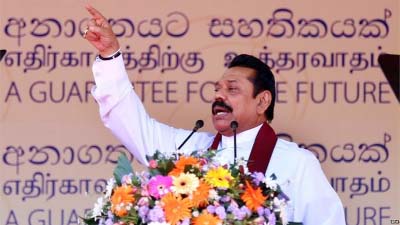
BBC, Colombo :
Sri Lanka’s former president Mahinda Rajapaksa has vowed to win an outright majority in parliamentary elections due on 17 August.
Mr Rajapaksa told BBC Sinhala he was confident of winning more than half the seats in parliament.
He is hoping to become prime minister, but the result is far from clear-cut.
A Rajapaksa win would mean an uneasy cohabitation with party rival Maithripala Sirisena, who beat him in presidential elections in January.
Their Sri Lanka Freedom Party remains divided over the two men – the president failed to stop his predecessor from standing as a party candidate in the polls.
Mr Rajapaksa was giving his first BBC interview since he was elected president in 2005 – relations during his nine years in power were strained over accusations of human rights abuses and media freedoms being curtailed.
“Clearly we will secure 117 seats,” he told BBC Sinhala. He rejected claims by the current Prime Minister, Ranil Wickramasinghe, that his campaign was in disarray.
But not everybody seems to agree with Mr Rajapaksa’s optimistic assessment of how votes will be cast.
Many analysts think both Mr Wickramasinghe’s United National Party (UNP)-led governing coalition and Mr Rajapaksa’s United People’s Freedom Alliance (UPFA) will struggle to secure an outright majority in the 225-member parliament.
In fact Mr Rajapaksa’s close allies do not seem to share his view either.
A close relative of Mr Rajapaksa privately told me that they are expecting about 105 seats. The general secretary of the UPFA told the BBC’s Azzam Ameen in Colombo that it may not be easy for any of the main parties to secure an outright majority.
Perhaps it is because of that concern that Mr Rajapaksa has changed his tough approach towards the media, including the BBC.
After nearly a decade of strained relations, Mr Rajapaksa, however, was friendly and even laughed while he answered questions.
He said he does not regret any of the policy decisions he took while in power – apart from one. “Calling an election two years ahead of schedule, I think, was a wrong decision,” he said. “I haven’t done anything else for me to regret.”
He strongly defended the controversial impeachment that ousted Chief Justice Shirani Bandaranaike in January 2014. The move was heavily criticised by the international community and legal watchdogs as an authoritarian and undermining the rule of law.
Sri Lanka’s former president Mahinda Rajapaksa has vowed to win an outright majority in parliamentary elections due on 17 August.
Mr Rajapaksa told BBC Sinhala he was confident of winning more than half the seats in parliament.
He is hoping to become prime minister, but the result is far from clear-cut.
A Rajapaksa win would mean an uneasy cohabitation with party rival Maithripala Sirisena, who beat him in presidential elections in January.
Their Sri Lanka Freedom Party remains divided over the two men – the president failed to stop his predecessor from standing as a party candidate in the polls.
Mr Rajapaksa was giving his first BBC interview since he was elected president in 2005 – relations during his nine years in power were strained over accusations of human rights abuses and media freedoms being curtailed.
“Clearly we will secure 117 seats,” he told BBC Sinhala. He rejected claims by the current Prime Minister, Ranil Wickramasinghe, that his campaign was in disarray.
But not everybody seems to agree with Mr Rajapaksa’s optimistic assessment of how votes will be cast.
Many analysts think both Mr Wickramasinghe’s United National Party (UNP)-led governing coalition and Mr Rajapaksa’s United People’s Freedom Alliance (UPFA) will struggle to secure an outright majority in the 225-member parliament.
In fact Mr Rajapaksa’s close allies do not seem to share his view either.
A close relative of Mr Rajapaksa privately told me that they are expecting about 105 seats. The general secretary of the UPFA told the BBC’s Azzam Ameen in Colombo that it may not be easy for any of the main parties to secure an outright majority.
Perhaps it is because of that concern that Mr Rajapaksa has changed his tough approach towards the media, including the BBC.
After nearly a decade of strained relations, Mr Rajapaksa, however, was friendly and even laughed while he answered questions.
He said he does not regret any of the policy decisions he took while in power – apart from one. “Calling an election two years ahead of schedule, I think, was a wrong decision,” he said. “I haven’t done anything else for me to regret.”
He strongly defended the controversial impeachment that ousted Chief Justice Shirani Bandaranaike in January 2014. The move was heavily criticised by the international community and legal watchdogs as an authoritarian and undermining the rule of law.

